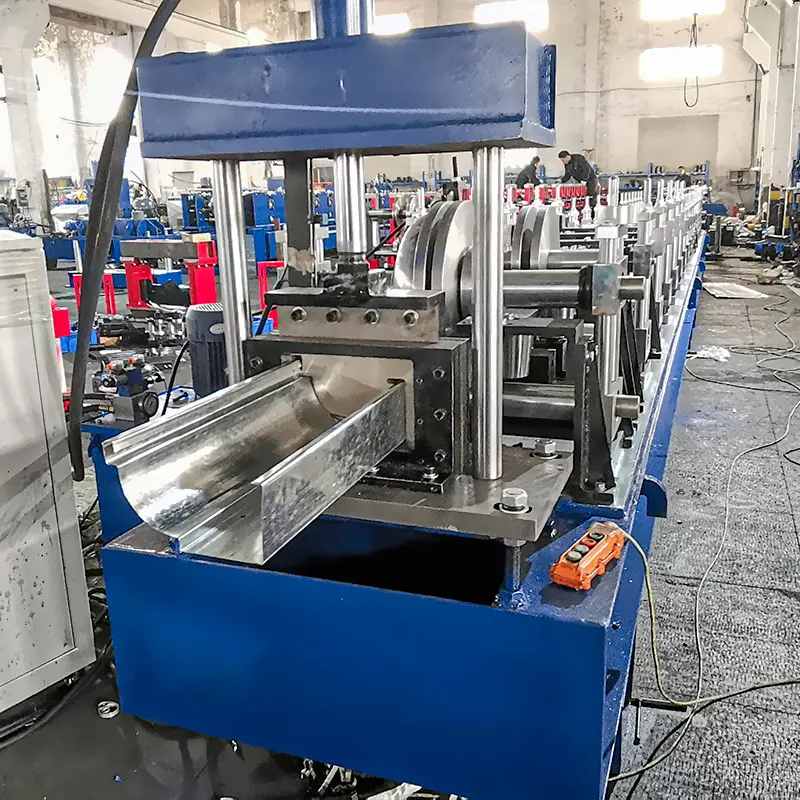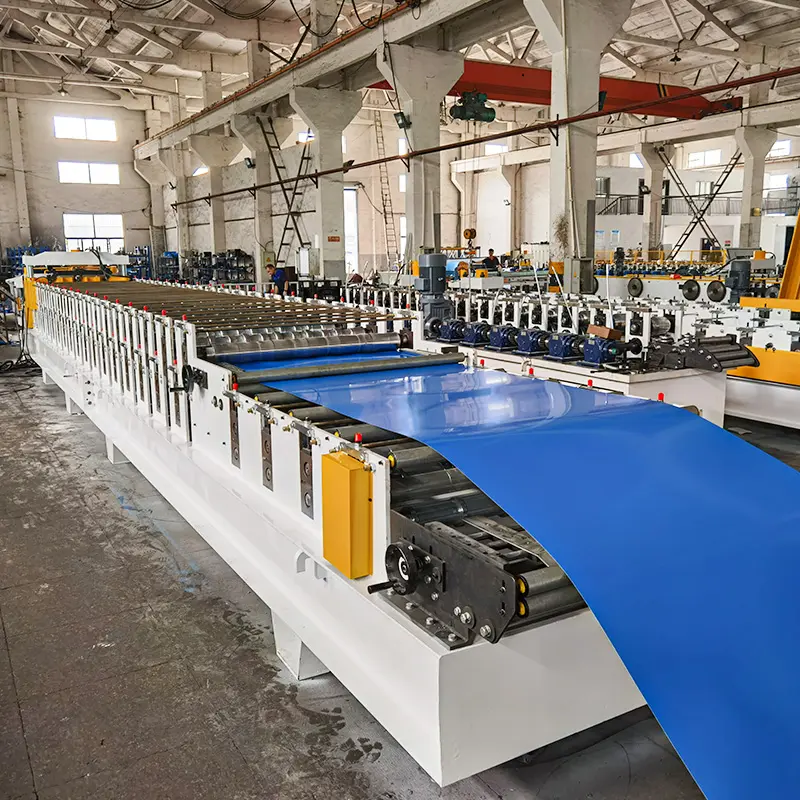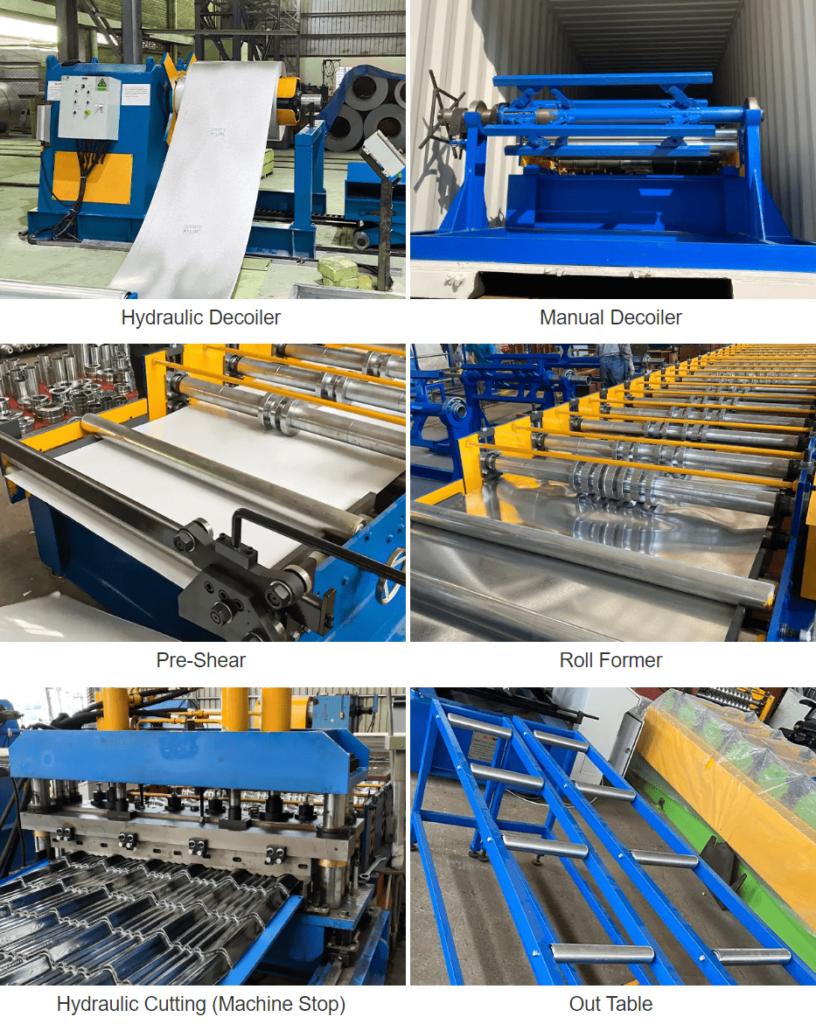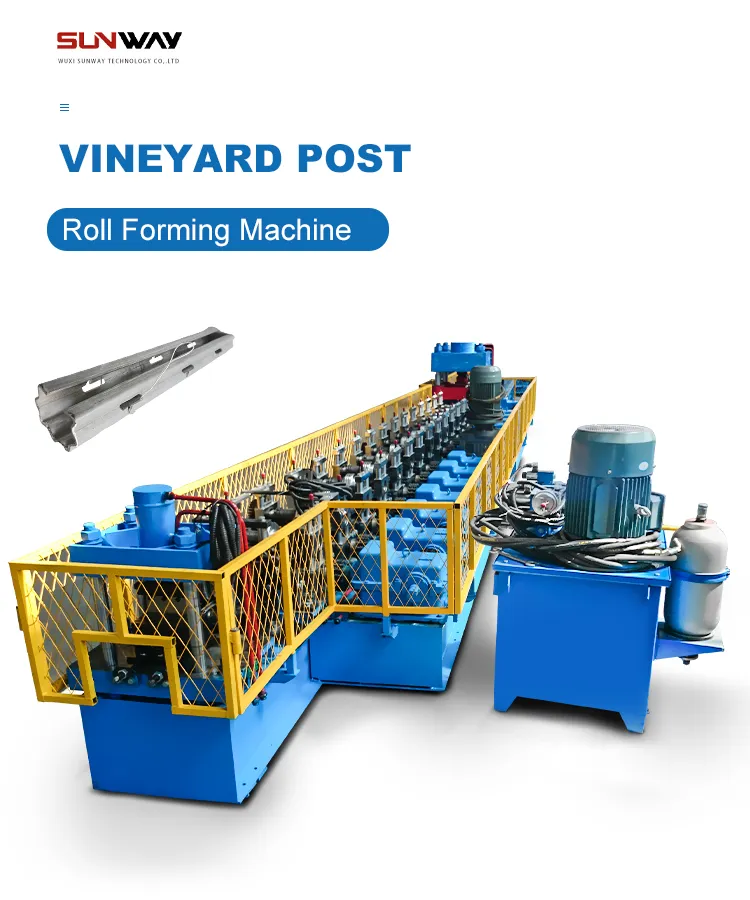परिचय
When it comes to fencing solutions, efficiency, cost-effectiveness, and precision play vital roles. The fence roll forming machine has revolutionized the fencing industry by offering a streamlined process for producing various types of fences quickly and accurately. This article explores the ins and outs of fence roll forming machines, from their functioning to their applications and everything in between.
What is a Fence Roll Forming Machine?
A fence roll forming machine is an advanced piece of equipment designed to transform raw materials, usually coils of metal, into finished fence products of various shapes and sizes. It utilizes a continuous bending process to shape the metal, ensuring consistent quality throughout the production.
How Does a Fence Roll Forming Machine Work?
The working principle of a fence roll forming machine involves feeding the metal coil through a series of rollers and dies. Each set of rollers gradually bends and shapes the metal until it reaches the desired profile. The process is continuous, allowing for high-speed production and minimal material waste.

Types of Fence Roll Forming Machines
There are various types of fence roll forming machines, each specialized in producing specific types of fences. Some common types include:
Picket Fence Roll Forming Machine
The picket fence roll forming machine is designed to produce picket-style fences commonly used in residential settings. It creates fences with evenly spaced vertical bars or pickets, offering an aesthetic appeal and security.
Chain Link Fence Roll Forming Machine
The chain link fence roll forming machine manufactures the widely popular chain link fences. These fences consist of interlocking wires, providing versatility and visibility, making them suitable for both residential and commercial applications.
Welded Mesh Fence Roll Forming Machine
Welded mesh fences are
Palisade Fence Roll Forming Machine
Forms pointed pales for intrusion deterrence.
Expanded Metal Fence Roll Forming Machine
Stretches metal into lightweight, visible meshes.
Advantages of Using a Fence Roll Forming Machine
Benefits abound:
लागत-प्रभावी उत्पादन
Optimizes material/labor, economical at scale.
定制选项
Adjustable for custom sizes/designs.
High Efficiency and Productivity
With continuous and automated production, fence roll forming machines deliver exceptional efficiency and productivity, effortlessly meeting stringent deadlines and demands.
: Collect/output.
The automated process guarantees uniform quality in every fence produced, minimizing defects or inconsistencies.

Factors to Consider When Choosing a Fence Roll Forming Machine
Selecting the right fence roll forming machine is essential for a thriving fencing business. Key factors to evaluate include:
सामग्री संगतता
Verify compatibility with your intended materials, such as steel, aluminum, or other metals.
Machine Size and Capacity
Assess available facility space and the production capacity needed to satisfy market demands.
Automation and Technology
Choose machines with cutting-edge automation and technology for superior efficiency and user-friendly operation.
Maintenance and Support
Select from a reputable manufacturer offering dependable maintenance support and readily available spare parts.
How to Operate a Fence Roll Forming Machine Safely
Safety must always be paramount when operating industrial machinery like fence roll forming machines. Adhere to these guidelines:
- Thoroughly review and comprehend the machine’s manual and operating instructions.
- Confirm that operators are properly trained and qualified.
- Wear suitable personal protective equipment (PPE), including gloves and safety goggles.
- Conduct regular inspections for wear or damage.
- Maintain a clean, unobstructed work area.
- Never override safety features or remove guards.
- Power down and lock out the machine during maintenance or repairs.
Tips for Maintaining a Fence Roll Forming Machine
Proper maintenance is vital for extending the lifespan and ensuring peak performance of your fence roll forming machine. Consider these tips:
नियमित सफाई और स्नेहन
Keep the machine free of debris and dirt, and lubricate moving parts regularly to prevent wear.
भागों की जाँच और प्रतिस्थापन
Inspect components routinely and replace worn or damaged parts immediately.
उचित भंडारण
Store the machine in a clean, dry environment when idle to shield it from environmental harm.

Common Quality Issues and Troubleshooting
Despite their efficiency, fence roll forming machines may face quality challenges. Here’s how to address common issues:
Uneven Material Feeding
Confirm correct loading of the material coil and proper adjustment of the feeding mechanism.
Forming Inconsistencies
रोलरों और डाइज़ की जाँच करें कि उनमें कोई क्षति या गलत संरेखण तो नहीं है जो बाड़ के अनियमित आकारण का कारण बन सकता है।
मशीन जाम और रुकावटें
मशीन के आंतरिक घटकों की जाँच करें कि क्या कोई बाधाएँ जाम का कारण बन रही हैं और उन्हें सावधानीपूर्वक साफ करें।
अत्यधिक शोर और कंपन
अत्यधिक शोर और कंपन ढीले या घिसे हुए पुर्जों का संकेत दे सकते हैं। पूरी जाँच करें और प्रभावित घटकों को कसें या बदलें।
रोल फॉर्मिंग मशीनों द्वारा निर्मित बाड़ उत्पादों के अनुप्रयोग
रोल फॉर्मिंग मशीनों द्वारा निर्मित बाड़ें विभिन्न उद्योगों में विविध अनुप्रयोग पाती हैं। कुछ सामान्य अनुप्रयोग निम्नलिखित हैं:
आवासीय बाड़बंदी
पिकेट बाड़, चेन लिंक बाड़ और सजावटी बाड़ आवासीय संपत्तियों के लिए लोकप्रिय विकल्प हैं, जो आकर्षण और सुरक्षा बढ़ाती हैं।
वाणिज्यिक और औद्योगिक बाड़बंदी
वाणिज्यिक और औद्योगिक स्थानों के लिए, बाड़ें सुरक्षा उपाय के रूप में कार्य करती हैं और सीमाओं को परिभाषित करने में मदद करती हैं।
कृषि बाड़बंदी
किसान बाड़ों का उपयोग फसलों और पशुओं को अतिक्रमणकारियों तथा जंगली जानवरों से बचाने के लिए करते हैं।
सुरक्षा बाड़बंदी
उच्च-सुरक्षा वाले क्षेत्रों जैसे सैन्य ठिकाने, जेलें और हवाई अड्डे अधिकतम सुरक्षा सुनिश्चित करने के लिए विशेष बाड़ों की आवश्यकता रखते हैं।
बाड़ रोल फॉर्मिंग का पर्यावरणीय प्रभाव और स्थिरता
विनिर्माण उद्योग में स्थिरता और पर्यावरणीय प्रभाव संबंधी चिंताएँ बढ़ रही हैं। बाड़ रोल फॉर्मिंग मशीनें कई तरीकों से स्थिरता में योगदान देती हैं:
- सामग्री दक्षता: रोल फॉर्मिंग मशीनें सामग्री उपयोग को अनुकूलित करती हैं, अपशिष्ट कम करती हैं और संसाधनों का संरक्षण करती हैं।
- ऊर्जा दक्षता: रोल फॉर्मिंग में उन्नत स्वचालन और कुशल प्रक्रियाएँ ऊर्जा खपत को न्यूनतम करती हैं।
- पुनर्चक्रण क्षमता: रोल फॉर्मिंग मशीनों द्वारा निर्मित कई बाड़ सामग्रियाँ जैसे स्टील और एल्यूमीनियम पुनर्चक्रण योग्य हैं, जो परिपत्र अर्थव्यवस्था को बढ़ावा देती हैं।
बाड़ रोल फॉर्मिंग प्रौद्योगिकी में भविष्य की प्रवृत्तियाँ
प्रौद्योगिकी के निरंतर विकास के साथ, बाड़ रोल फॉर्मिंग मशीनें आगे की प्रगति देखने की संभावना रखती हैं। कुछ संभावित भविष्य की प्रवृत्तियाँ निम्नलिखित हैं:
- एआई और मशीन लर्निंग का एकीकरण: एआई-संचालित मशीनें वास्तविक समय में डेटा विश्लेषण कर सकती हैं, जिससे अधिक सटीक और कुशल उत्पादन प्रक्रियाएँ संभव होती हैं।
- स्थिरता-केंद्रित डिज़ाइन: निर्माता पर्यावरण-अनुकूल विशेषताओं और सामग्रियों को प्राथमिकता दे सकते हैं ताकि स्थिरता की माँगों को पूरा किया जा सके।
- उन्नत स्वचालन: रोल फॉर्मिंग मशीनें और भी अधिक स्वचालित हो सकती हैं, जिसमें न्यूनतम मानवीय हस्तक्षेप की आवश्यकता हो।

निष्कर्ष
बाड़ रोल फॉर्मिंग मशीनों ने विभिन्न प्रकार की बाड़ों के लिए कुशल, लागत-प्रभावी और उच्च-गुणवत्ता वाली समाधान प्रदान करके बाड़ उद्योग में क्रांति ला दी है। उनके स्वचालित उत्पादन प्रक्रियाओं, अनुकूलन विकल्पों और सुसंगत उत्पादन के साथ, ये मशीनें बाड़ निर्माताओं के लिए अपरिहार्य हो गई हैं। सुरक्षा दिशानिर्देशों का पालन करके और नियमित रखरखाव करके, व्यवसाय अपनी बाड़ रोल फॉर्मिंग मशीनों की दीर्घायु और इष्टतम प्रदर्शन सुनिश्चित कर सकते हैं, जिससे बाजार में उनकी सफलता सुनिश्चित होती है।
常见问题解答
Uneven Forming क्या बाड़ रोल फॉर्मिंग मशीनें जटिल डिज़ाइनों वाली बाड़ें उत्पन्न कर सकती हैं?
Cutting Issues हाँ, समायोज्य सेटिंग्स के साथ, बाड़ रोल फॉर्मिंग मशीनें जटिल और कस्टम डिज़ाइनों वाली बाड़ें उत्पन्न कर सकती हैं।
Uneven Forming क्या रोल-फॉर्म्ड बाड़ें टिकाऊ होती हैं?
Cutting Issues हाँ, रोल-फॉर्म्ड बाड़ें अपनी टिकाऊता और मजबूती के लिए जानी जाती हैं, जो उन्हें दीर्घकालिक उपयोग के लिए आदर्श बनाती हैं।
Uneven Forming बाड़ रोल फॉर्मिंग मशीनों के साथ कौन-सी सामग्रियाँ उपयोग की जा सकती हैं?
Cutting Issues बाड़ रोल फॉर्मिंग मशीनें स्टील, एल्यूमीनियम और अन्य धातुओं सहित विभिन्न सामग्रियों के साथ कार्य कर सकती हैं।
Uneven Forming क्या बाड़ रोल फॉर्मिंग मशीनों का रखरखाव आसान है?
Cutting Issues हाँ, नियमित सफाई, स्नेहन और जाँच के साथ, बाड़ रोल फॉर्मिंग मशीनों का रखरखाव आसानी से किया जा सकता है।
Uneven Forming क्या बाड़ रोल फॉर्मिंग मशीनों का उपयोग स्थल पर उत्पादन के लिए किया जा सकता है?
Cutting Issues हालांकि बाड़ रोल फॉर्मिंग मशीनों का उपयोग सामान्यतः विनिर्माण सुविधाओं में किया जाता है, कुछ पोर्टेबल मॉडल स्थल पर उत्पादन की अनुमति देते हैं।
